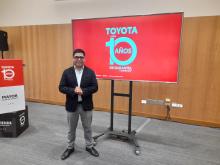
The executive of the Peruvian financial holding company details how this technology is not only transforming processes within the organization, but also its interaction with other financial institutions and, above all, with its clients. The ethical and safe use of technology and the attraction of specialized talent for its management are the main pending challenges.
In the artificial intelligence (AI) world, generative intelligence is what concentrates much of the attention of companies today, both globally and in the region. The ability to automate repetitive tasks so that workers can focus on strategic core business is driving the trend.
In industries such as finance, however, the search to take advantage of AI benefits transcends generative AI and includes other equally relevant variants, such as cognitive AI. The latter mainly covers the technologies and tools that allow apps, websites and bots to see, hear, speak, understand and interpret the user's needs through natural language. Or, as Telefónica Tech's Datapedia defines it, “they are AI applications that allow machines to learn the language of users so that they do not have to learn the language of machines.”
In the financial services industry, cognitive AI – which uses enormous amounts of data to copy the functioning of the human brain – has proven to be a growing bet for banks to gain a competitive advantage. In Latin America, Credicorp, the Peruvian financial holding company with operations in Colombia, Chile, Bolivia, the United States and Panama, has been applying this branch of AI in various areas. Customer experience is one of them, but not the only one.
AméricaEconomía spoke with Rafael Lemor, head of the AI Program at BCP and Credicorp, who detailed the potential of using cognitive AI and the challenge of its management and responsible use to protect the information of clients in the region. From marketing to software development, to automating manual reviews, cognitive AI aims not only to transform processes, but also the relationship between financial institutions and their customers.
-Artificial intelligence (AI) is revolutionizing various industries and the financial business is no exception. In the case of cognitive AI, how does it impact the sector?
AI, especially in its cognitive form, is revolutionizing the way financial institutions operate, interact with their customers, and make strategic decisions.
For example, if we talk about personalized value generation, cognitive AI allows financial institutions to generate specific value for each customer. Not only at the level of customizing better products, but also [being able to] anticipate needs and serve them at the right time.
In terms of automation and efficiency, the automation of internal and external processes is one of the greatest benefits of cognitive and/or generative AI. By eliminating repetitive and routine tasks, financial institutions can free up resources to focus on more creative and analytical activities.
When we talk about these improvements, we are referring to the customer experience by offering increasingly personalized and immediate attention on the main channels on one hand. And, on the other, there is the improvement of customer protection. By analyzing large volumes of data, suspicious patterns can be detected and security teams alerted to protect our clients' financial products.
In short, cognitive AI not only transforms processes, but also redefines the relationship between financial institutions and their customers. Those organizations that strategically adopt these technologies will be better positioned to lead the next wave of innovation in the financial world.
-In which areas is AI key and why? How do they implement it at Credicorp?
Artificial intelligence has ceased to be a mere technological trend and has become a fundamental pillar in the business world. At BCP and Credicorp, the strategic adoption of AI is being prioritized in the fields of most value for our clients and collaborators. For example, in customer service, through chatbots that allow customers to self-serve and resolve their concerns quickly and in a personalized way.
Access the PDF of the Data & AI Special from the March edition of AméricaEconomía here
In marketing and sales in the competitive financial world, customer segmentation and a personalized offer are essential. AI makes it possible to analyze behavior patterns, preferences and individual needs. This way, we can design more effective marketing campaigns and offer specific products at the right time. Another important area is software development. AI doesn't just improve existing products and services. It drives innovation in software development. At Credicorp we are exploring its use to empower our collaborators, through tools that allow them to be more productive in the creation of software.
Finally, AI is important for automating manual reviews of legal documents, contracts, and to help requests can be slow and error-prone. And AI, through natural language processing and anomaly detection, speeds up this process.
The key is to adopt it consciously and strategically, always with the aim of improving the customer experience and creating a positive impact on society.
-How does Credicorp maximize the use of AI for different fronts of its operations?
We have outlined a strategic path that allows us to take advantage of technology in a safe, responsible and, above all, effective way. On the one hand, Credicorp has established a corporate program dedicated exclusively to AI. This program not only promotes the adoption of advanced technologies. It also establishes clear guidelines for its ethical and safe use. Our commitment is to drive innovation without compromising the trust of our customers or the integrity of our operations.
We are convinced that collaboration is the key to success. Within the Credicorp group, we have created an ecosystem of continuous learning. Sister companies share experiences, lessons learned and success stories related to AI. This allows us to avoid common obstacles and capitalize on opportunities.
AI is not an end, but a means to achieve our purpose. We are committed to continuing to explore new applications, learn from our mistakes, and adapt to an ever-changing world.
-What results or benefits have you obtained with cognitive AI?
As we deploy various initiatives, the results and benefits begin to manifest. This year [cognitive AI] promises to be a milestone in our journey. We hope to have increases in productivity and improvement in the customer experience.
-Despite the advancement of AI, there are ethical challenges to maximize its benefits. How does Credicorp address these challenges?
In the midst of this new transformation process, the challenges we face are linked to the responsible management and use of technology to guarantee that our algorithms are ethical. That they do not perpetuate biases and protect our clients' information. In that same sense, we always ensure that the trust of our clients is not lost with these new technologies. We achieve this by clearly and transparently communicating our initiatives related to AI.
-Another challenge for organizations is to attract specialized talent to manage this artificial intelligence. What difficulties do you face in this field?
The use of this new technology requires us to be in constant search for talent that understands and applies it, complying with all the ethical and safety standards that we always cultivate. And [that you have] sufficient preparation to navigate a new, constantly changing paradigm.
At BCP and Credicorp we want to be a benchmark technology company. We want to attract the best talent specialized in AI, collaborating with universities, promoting research and strengthening the diversity of perspectives. Finally, AI adoption requires a cultural change. We educate our employees about the benefits and challenges. We show them how AI can improve their daily tasks and unleash their creativity. Constant communication is key.










